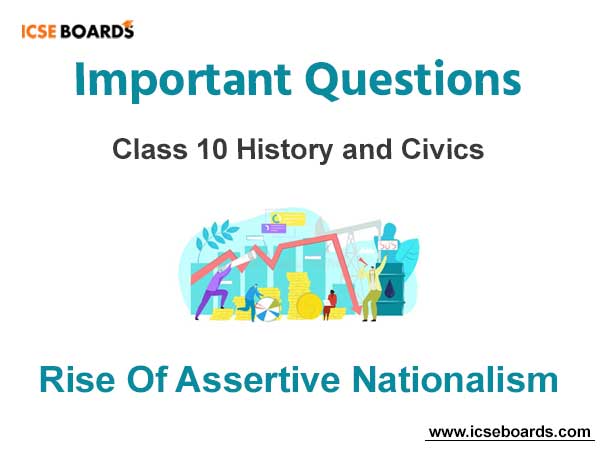Students of ICSE Class 10 should refer to Rise of Assertive Nationalism ICSE Class 10 Questions and answers below which have come in past board exams. You should always go through questions which have come in previous years so that you can understand the pattern of questions in ICSE Class 10 History and prepare accordingly. This will help you to get better marks in ICSE Class 10 Board Exams
ICSE Class 10 Rise of Assertive Nationalism Questions and Answers
Please refer to solved questions for chapter Rise of Assertive Nationalism provided below. These questions and answers are expected to come in the examinations. Students should learn these so that they are able to answer the questions properly in exams and get good marks. Refer to Important Questions for ICSE Class 10 History and Civics for all chapters on our website.
Rise of Assertive Nationalism Questions and Answers
Notes for Rise of Assertive Nationalism
Causes of the rise of assertive nationalism
• Failure of the Early nationalist cause their means.
• Tilak presented true picture of British rule in kesari and Maratha.
• Between 1851-1900 the people of various parts of India suffered drought and famines but British government did not adopt measures.
• Tilak attacked British policies in his newspapers
• British policies led poverty and unemployment.
• Many Educated Indians were unemployed.
• Lord Curzon passed many acts against Indians such as Official Secrets Act, The Indian University Act, The Calcutta Corporation Act.
• Ill- Treatment of Indians in Africa such as Unjust taxes, The Registration Act etc.
• Many leaders were sent jails because their repressive policies.
• Russia and Italy defeated by Japan and Ethiopia respectively that encouraged Indians.
• Nationalist inspired from western ideas.
• Partition of Bengal added fuel to the fire.
• Lal , Bal , Pal was the most important factor which contributed to the rise of Assertive nationalism.
Principles or Objectives of Assertive Nationalism
• They wanted Swaraj.
• They beloved in supremacy of Indian Culture.
• They Had no faith in British rule.
• They supported the Swadeshi goods.
• They wanted moral progress of Indians.
• They did not believe in constitutional means.
Methods of The Assertive Nationalists
• Swadeshi: Its mean producing the essential goods in own country.
• Boycott: Swadeshi and Boycott are like two sides of same coins.
• National Education: They introduced national schools.
• Passive Resistence: They asked the people to refuse to help government.
Achievements of The Assertive Nationalists
• They preached the method of self-respect.
• They declared sacrifieces were needed for Independence.
• They propagated use of Swadeshi.
• They gave birth nationalist sentiments.
• They infused spirit of Assertive nationalism by their newspapers in Indians.
• Produce revolutionaries who were ready for any type of sacrifice.
Contribution of Bal Gangadhar Tilak
• He is known as Father of Assertive nationalism.
• Born- 23 July 1856 in Maharashtra
• He started Kesari and the Maratha.
• He organized Swadeshi and Boycott movement.
• He was tried for sedition.
• He Started home rule movement.
• Books – The Gita Rahasya and The Arctic Home of the Vedas.
Contribution of Lala Lajpat Rai
• He was born in a vaish family of village Jagraon in Ludhiana district of the Punjab in 1865.
• He died in 1928 as a result of lathi blows.
• He was great speaker, a writer.
• He was social reformer and educationalist.
• He set up ‘servants of the people society’.
• He was active worker of Arya Samaj.
Contribution of Bipin Chandra Pal
• He was born on September 71 1858 in Assam.
• He became the editor of New India.
• He joined Brahmo Samaj.
• He was teacher.
• He joined the congress in 1897.
• He joined the Assertive nationalist group.
• He was a speaker.
• He wanted to achieve Sawaraj.
• His programs consisted of Swadeshi, Boycott, National education.
• He was Strong supporter of democracy.
• He dead in 1932.



